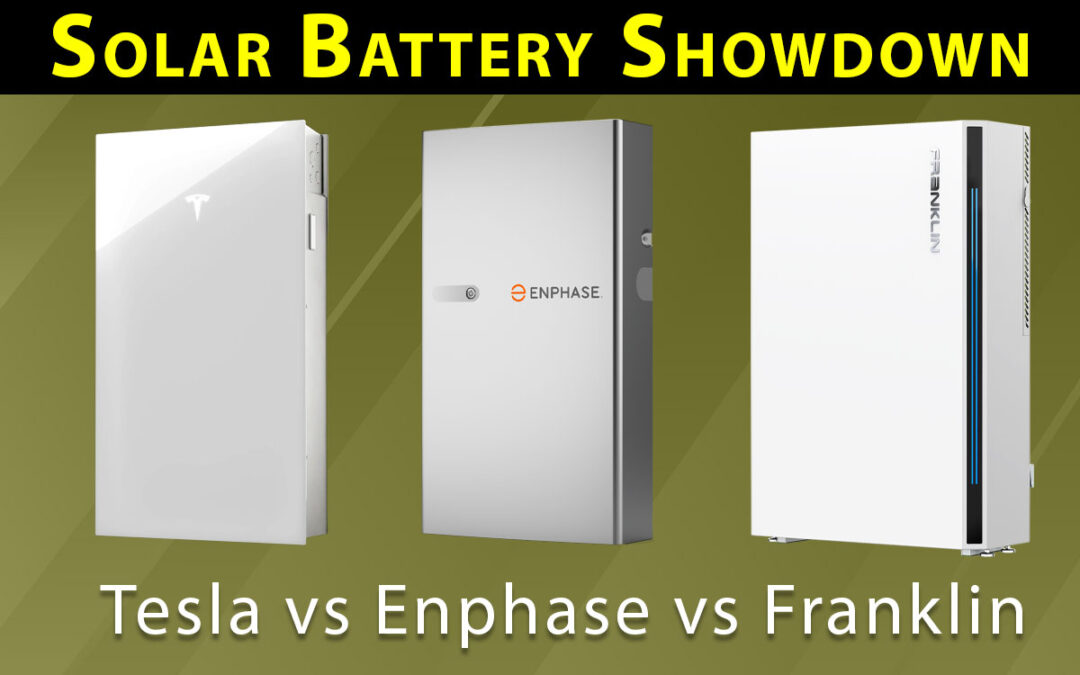We have published a new version of this blog post featuring the Tesla Powerwall 3, Enphase IQ 10C and FranklinWH aPower 2 HERE.
One of the most common questions we’re asked is, “Should I install a battery with my solar panel system?”
With rising concerns over power grid outages during extreme weather events, energy storage has become an increasingly important piece of the solar puzzle. At Good Energy Solutions, we primarily install three different brands of solar batteries: Tesla, Enphase, and Franklin.
Which battery makes the most sense for your situation?
In this article, we’ll run down the differences between these three battery brands, including their capabilities, availability, and stacking options.
Let’s start with the basics of solar batteries.
Simply put, solar batteries store excess electricity generated by your solar panels. That stored energy can power your home when your panels aren’t generating electricity—such as at night or on cloudy days. Batteries can also keep your home running during a power outage.
It’s important to note that in most installations without a battery, your home will not be able to use the electricity generated by your solar panels when the grid goes down. Because your solar panel system is connected to your utility’s electrical grid, it will stop producing energy if the power goes out. This safety mechanism protects utility workers who may be repairing power lines during an outage from the risk of electrocution.
AC-coupled batteries like the Tesla Powerwall and Enphase IQ automatically disconnect your system from the grid when a power outage occurs. They then use the stored battery power—or energy from your solar panels—to supply electricity to your home’s critical loads. This setup allows your system to function as a code-compliant, off-grid solution until the utility restores power.
Another major selling point for solar batteries is the 30% federal solar tax credit, which can be applied toward the final cost of your system.
Tesla Powerwall vs Enphase IQ 5P vs Franklin aPower?
Let’s take a look at each battery and see how they stack up against each other. These three batteries share a lot in common. All are AC-coupled, which makes them easier to install with an existing solar panel system. They are also primarily designed for emergency backup. In addition, all three feature user-friendly apps that allow you to monitor your home energy system in real time and adjust how power is distributed throughout the day.
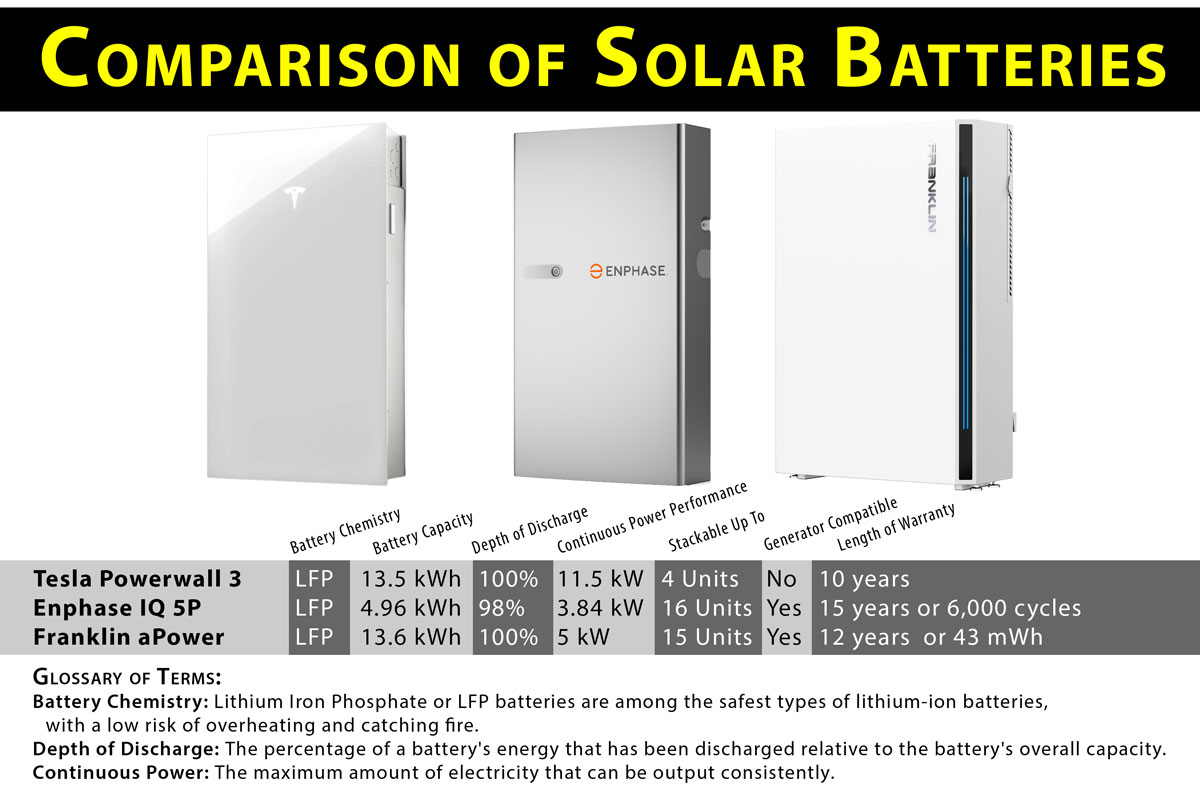
Tesla Powerwall
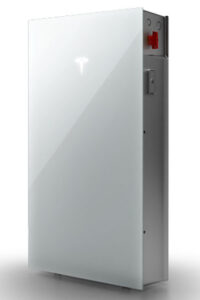
Tesla Powerwall 3
Tesla has designed this AC battery system for residential and light commercial use. It utilizes a lithium-ion battery that runs much quieter and cleaner than a conventional gasoline back-up generator. There’s no exposed vents that expel heat or visible wires making it a safer solution for households with kids or pets. The Tesla Powerwall 3 is compatible with new and existing solar panel systems. It can also work as a stand-alone home battery without solar panels. Tesla batteries can be installed with most brands of solar panels. You don’t need Tesla solar panels to install a Powerwall.
The Upside: The Powerwall has become the biggest name in solar batteries since launching in 2015. It sports a sleek design and mounts nicely to the wall. Multiple Powerwalls can be stacked together to boost storage capacity and power more appliances throughout your home or business. Also, the Powerwall is one of the least expensive solar battery options on the market. Unlike the other two batteries that we offer, the Powerwall 3 can be DC or AC coupled.
The Downside: Its lower price has created a waitlist for the Powerwall. Depending on when you order one from Tesla, it could take months before your Powerwall arrives. Also, the Powerwall requires multiple electric boxes and additional parts to meet local electrical codes. These add-ons take up space, limiting your ability to work them into a workable design scheme while leaving you fewer options for concealment.
Here are the Powerwall’s technical details:
| Tesla Powerwall 3 | |
| Usable capacity | 13.5 kWh |
| Round-trip efficiency | 97.5% |
| Depth of discharge | 100% |
| Continuous power output (on-grid) | 11.5 kW |
| Battery type | Lithium-ion |
| Size |
43.3″ H x 23.6″ W x 7.09″ D
|
| Warranty | 10 years |
Enphase IQ 5P
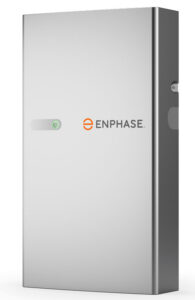
The Enphase IQ Battery 5P
Although they are one of the most recognizable brands in the solar industry for their line of microinverters, Enphase also offers an excellent alternative to the Tesla Powerwall. The company’s most popular solar battery option, the IQ Battery 5P, rivals the power output of larger batteries at half the capacity size. Enphase has designed its line of batteries to be installed in bundles, creating a modular storage system where capacity and power output stack with each battery installed. This makes it easier to size a battery system for your specific needs. The Enphase IQ Battery 5P seamlessly integrates with the Enphase Enlighten monitoring system, giving you real-time insights into your energy usage and storage.
The Upside: Enphase is one of the most trusted companies in the solar industry. They back up their reputation with one of the best solar battery warranties on the market with 5P. Enphase IQ batteries can also be paired with gas-powered generators for extra backup protection and flexibility. The batteries’ lithium iron phosphate chemistry is safer and lasts longer than other competitors. Their smaller energy output comes with a lower cost, making them an excellent choice for backing up circuits that cover important smaller electronics like medical devices or sump pumps.
The Downside: Enphase batteries have a lower power output individually than others on the market. These need to be stacked in order to provide enough backup protection for the biggest electrical appliances in your home.
Here are the IQ’s technical details:
| Enphase IQ Battery 5P | |
| Usable capacity | 4.96 kWh |
| Round-trip efficiency | 90% |
| Depth of discharge | 98% |
| Continuous power output (on-grid) | 3.84 kW |
| Battery type | Lithium-ion |
| Size |
38.6″ H x 27.7″ W x 7.4″ D
|
| Warranty | 15 years or 6,000 cycles |
Franklin aPower
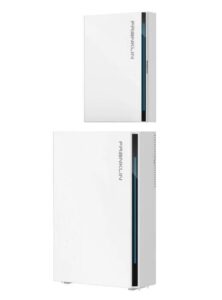
Franklin Whole Home Battery System
Franklin is newcomer to the market introducing its first home battery in 2022. The company has quickly gained positive reviews and is now a notable option for homeowners considering solar batteries. Franklin designed the aHome battery with a focus on providing “whole-home backup,” ensuring that property owners maintain power during outages. The battery supports a peak power output of 10 kW and a continuous output of 5 kW. The aPower battery will also need to be teamed with a smart energy management unit from Franklin called the aGate. The aGate controls battery charging and power flow in the home. It can be set to charge the batteries from solar, the grid, and even an AC backup generator.
The Upside: You can install up to 15 aPower battery units for a total energy storage capacity of 204 kWh. While this amount of power is more than most homes will ever require, it’s nice to know you have the ability to expand your system with new aPower units as needed.
The Downside: The Franklin whole home backup system is more expensive than some other batteries on the market.
Here are the aPower’s technical details:
| Franklin aHome | |
| Usable capacity | 13.6 kWh |
| Round-trip efficiency | 89% |
| Depth of discharge | 100% |
| Continuous power output (on-grid) | 5 kW |
| Battery type | Lithium-ion |
| Size |
45.3 in H × 29.5 in W × 11.4 in D
|
| Warranty | 12 years or 43 mWh |
Tesla Powerwall, Enphase IQ 5P or Franklin aPower?
Several variables will factor into which battery will work best for your solar installation. At Good Energy Solutions, we stand behind all three battery systems and recognize the benefits of adding any of them to your energy plan. Our consultants can help you choose the right option for your solar installation based on price, power needs, maintenance, and longevity. If you’d like to speak with one of our solar consultants about battery backup systems for your home or business, contact us here.
SEE IF YOUR HOME OR BUSINESS IS A GOOD MATCH FOR SOLAR
GET A FREE QUOTE
Contact Form from Blog
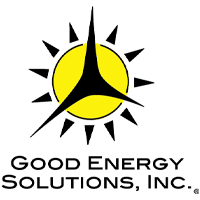 Our mission at Good Energy Solutions is to provide our customers with honest, real solutions to reduce their fossil fuel consumption and lower their long term energy costs. Our combination of hands-on experience, education, and outstanding customer service make our company the clear choice to help you achieve your energy goals.
Our mission at Good Energy Solutions is to provide our customers with honest, real solutions to reduce their fossil fuel consumption and lower their long term energy costs. Our combination of hands-on experience, education, and outstanding customer service make our company the clear choice to help you achieve your energy goals.
Founded in 2007 by Kevin and Shana Good, Good Energy Solutions has earned a reputation for our expert reliable service, long workmanship warranties, and quality commercial and residential solar installations.
We are engineers and craftsmen designing for efficiency while keeping aesthetics and longevity in mind. Because of our installation quality and customer service, Good Energy Solutions' solar panel systems feature some of the longest product and service warranties in Kansas and Missouri. Also, we have more NABCEP® Certified Solar Professionals on staff than any other company in Kansas or Missouri. To achieve this certification, PV installers must demonstrate that they possess extensive solar PV installation experience, have received advanced training, and passed the rigorous NABCEP certification exam.
If you would like to know more about solar power for your home or business, contact us here.

